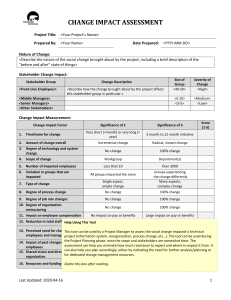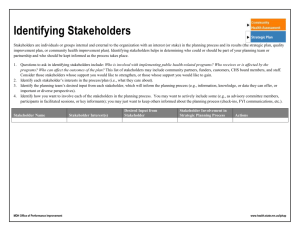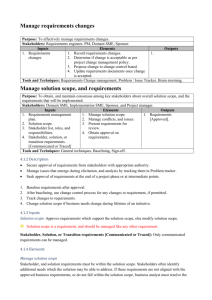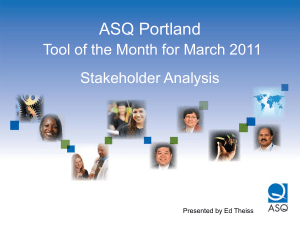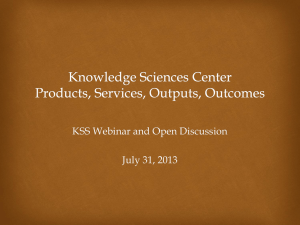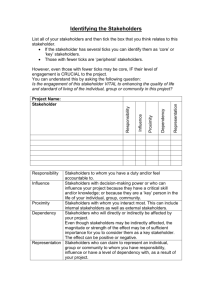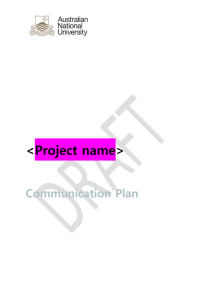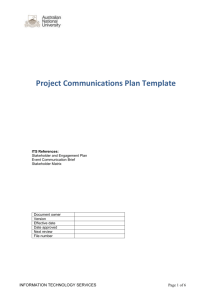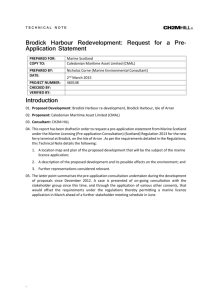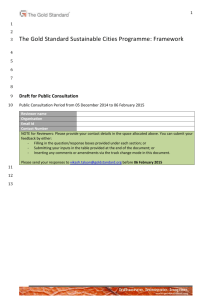communication-management-plan
advertisement
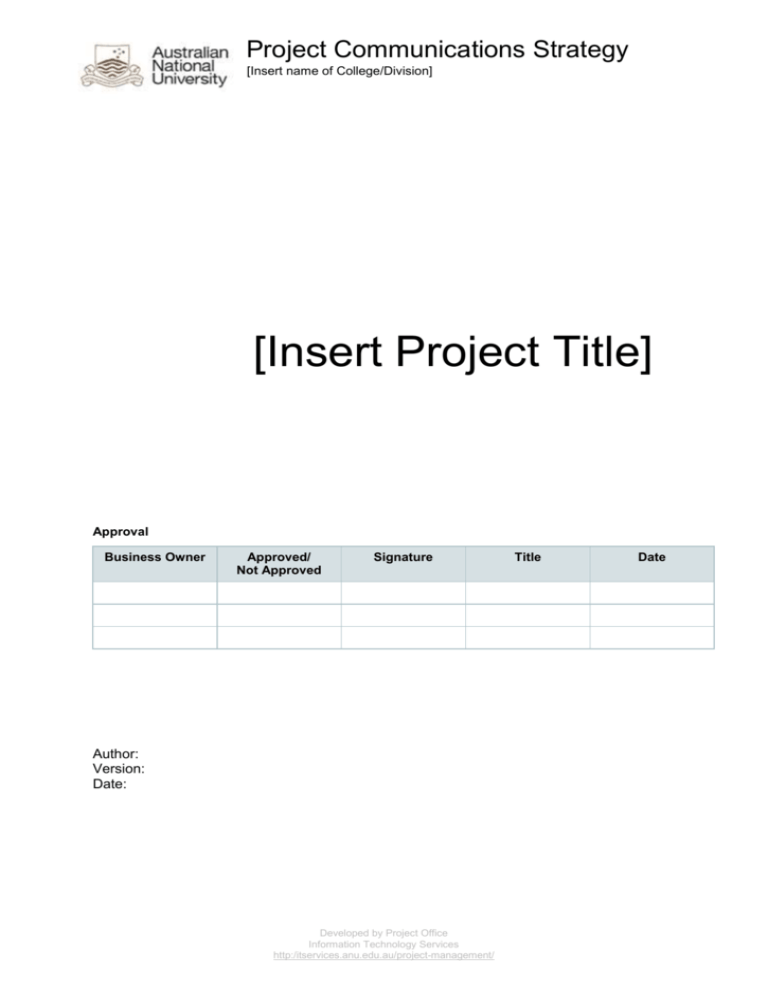
Project Communications Strategy [Insert name of College/Division] [Insert Project Title] Approval Business Owner Approved/ Not Approved Signature Author: Version: Date: Developed by Project Office Information Technology Services http:/itservices.anu.edu.au/project-management/ Title Date PROJECT COMMUNICATIONS STRATEGY – [Insert Project Title] 1 Introduction 1.1 Purpose The Communications Plan documents the communication processes, stakeholder’s analysis and communication activities to be undertaken throughout the project. 1.2 1 2 3 Objectives Raise the general awareness and understanding of the project, and ensure perceptions are managed; Maximise ongoing commitments and support of the Project Sponsor and key stakeholders for all aspects of the project; and Optimise project communication opportunities and minimise communication or misinformation risks. 1.3 Scope This plan covers the communication process, tools and techniques to be used for the duration of the project. 2 Communication Procedure [This procedure provides an insight into how to prepare a communication management plan. Please read it before proceeding with this template.] The project will adopt the communication processes identified in the “PMO Communication processes” document available on the PMO intranet. 3 Communication Themes 3.1 Key Messages [Identify key messages that the project manager \ project sponsor will use when communicated about the project.] Text example: “The key messages to be communicated about this project are: 3.2 ITS’s Project Management capabilities increasing – The PMO will utilise the delivery of this project as a platform to increase project management capabilities. Emphasis will be given to finance and scope, schedule development and forecasting and creation of a repository for project registers (SharePoint). “ General Sensitivities [Define general political, reputational or other sensitivities about this project that the project expects. This section will help develop positive engagement strategies in the Stakeholders orientation section.] PAGE 2 OF 5 THE AUSTRALIAN NATIONAL UNIVERSITY PROJECT COMMUNICATIONS STRATEGY – [Insert Project Title] CHALLENGES COMMUNICATIONS RESPONSE(S) Tight project timelines which, unless managed effectively, could impact the breadth of consultation and quality of outputs Directly share with stakeholders the project timelines and explain the constraints the Project Team is working under, as well as communicating the timeline on the Project Team website and project newsletter Identify and promote opportunities for stakeholders to be involved Tailor consultation processes where possible to ensure stakeholders have an opportunity to engage ie if there is only a short period to provide feedback, proactively engage with the stakeholder rather than waiting for a response Potential stakeholder confusion about the Project approach, scope and / or the nominated project solution Clear and agreed messages about the project and key decisions communicated both formally and informally Creation of a simple fact sheet/chart which illustrates the project approach and nominated solution and opportunities to provide input Reiterate the approach at any consultation forum Utilise existing communications forums to convey key messages (e.g. existing regulator newsletters, links to Project Team website, workshops) Key opportunities for input and decisions advised via monthly newsletters and Project Team website Potential stakeholder dissatisfaction about the opportunities to provide communication input and influence the way they are communicated Clear and agreed key messages about the project and opportunities to provide input and feedback Development of a simple fact sheet/chart which illustrates the process and opportunities to provide input Reiterate the project process at any consultation forum Ensure that all input by stakeholders is appropriately addressed in a timely manner Potential anxiety among staff about the change Consistent, regular message to all staff Development of a Change Management Plan in close consultation with current Division Heads as required Managing staff expectations about the software capability Clear and agreed messages about the project and functional design elements communicated both formally and informally Strong leadership by the Project Executive and Project Team members Lack of stakeholder buy in for the proposed solution Strong stakeholder engagement and communication processes to ensure stakeholders are involved in the project Clearly demonstrate the advantages and efficiencies the project will deliver Clearly articulate the ‘big picture’ goal and that the project is working for and the benefits of a best‐ practice approach PAGE 3 OF 5 THE AUSTRALIAN NATIONAL UNIVERSITY PROJECT COMMUNICATIONS STRATEGY – [Insert Project Title] 3.3 Potential “Good News” Project Events [Identify events that if broadcasted can put the project (or project sponsor) in a favourable light and create momentum within the team.] EVENT 3.4 AUDIENCE SUGGESTED APPROACH AND MESSAGES Potential “Bad News” Project Events [Identify events that could cause the project to look bad in the eyes of the user or stakeholders and develop a strategy to reduce the impact on the project.] EVENT 4 4.1 AUDIENCE SUGGESTED APPROACH AND MESSAGES Stakeholders Analysis Key Stakeholders Groups [List all stakeholders and place them in the chart based on their current state of influence and interest levels. Next, place stakeholders in their desired state. If different, you will need to develop a positive engagement strategy in the next section “Stakeholder orientation”] The following chart presents the stakeholders levels of interest and influence with regard to the project: PAGE 4 OF 5 THE AUSTRALIAN NATIONAL UNIVERSITY PROJECT COMMUNICATIONS STRATEGY – [Insert Project Title] More Face to Face K High ed ne – n s -i er uy ay b Pl ong ey str A e iv ct Medium n tio lta su on n ai nt ai Influence C M r te in es t K ee rm fo In Low p ed Written Messages Medium Low High Interest - Current State and require change - Desired State - Consistent State 4.2 Key Stakeholders Orientation [The purpose of key stakeholder orientation is to segment stakeholders based on their interest, impact and communication preferences. This is best done in a table (possibly in Excel) The Excel template also includes explanation of each column. ] Stakeholder group Internal/External Overall Support Rating Interest and \ or concerns Positive Engagement Strategy Method of Communication Frequency Feedback PAGE 5 OF 5 THE AUSTRALIAN NATIONAL UNIVERSITY
